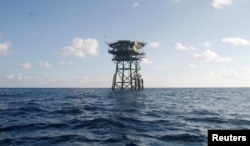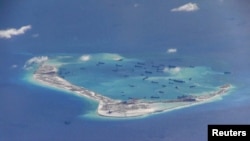As China’s foreign minister seeks to correct U.S. government ideas about Asia’s major maritime dispute, specialists say the Beijing official is distorting history.
Agreements that took effect after World War II required that former Chinese territories taken by Japan be returned to China, Chinese Foreign Minister Wang Yi said, according to a statement on the ministry’s website February 7.
Wang was speaking of tiny islets in the South China Sea, a 3.5-million-square-kilometer body of water contested all or in part by Brunei, Malaysia, Taiwan, Vietnam and the Philippines for its prized fisheries, fossil fuel reserves and shipping lanes.
Scholars criticize China's position
China is taking treaties and declarations out of context to back its claims, scholars say.
“I think there is some truth to the historical facts, quote quote, that he referred to in his talk, but it’s not the whole truth and I believe that they were stretching the scope and the depth of the historical records, as well,” said Yun Sun, East Asia Program senior associate at the Stimson Center think tank in Washington.
China is the most militarily powerful claimant. It has asserted sovereignty since 2010 through landfill work and the militarization of some islets.
Philippines and Vietnam have fought back
Vietnam grew angry enough with China in 2014 to ram its boats and spark anti-Chinese riots. The Philippines won a world arbitration court ruling in July 2016 against the historical basis for Beijing’s sea claims.
The U.S. government has no claim but questions China’s moves to landfill islets and expand its military presence across the sea.
Spratly Islands dispute
The 1943 Cairo Declaration and 1945 Potsdam Declaration cited by Beijing’s foreign minister say China should regain the sea’s Spratly Islands as land taken from China by Japan during the war.
But Vietnam can argue the agreements do not cover islets previously held by other countries, such as France, Sun said.
Vietnam disputes China’s sovereignty over the Spratly Islands based on the two declarations, according to a paper by the Model United Nations of The International School of The Hague. Vietnam also has reclaimed land in the chain of 14 islets and 100 reefs.
Those two declarations say the Republic of China should get lands back from Japan. They do not mention the People’s Republic of China, which took control in 1949 of today’s mainland China. The Republic of China government lost the mainland in a civil war to the Communists and is now the constitutional government of Taiwan.
China’s foreign minister was quoted saying in Canberra, where he went to meet with his Australian counterpart, that the Spratly Islands are covered by the post-war declarations.
Communist China does not recognize the Republic’s government in Taiwan, which is backed by 21 diplomatic allies compared to more than 170 that recognize Beijing. China claims sovereignty over self-ruled Taiwan itself, as well.
China has a strong, but not airtight, case
“China’s claim to sovereignty over the South China Sea is grounded in diplomatic history and on specific international treaties and documents,” said Fabrizio Bozzato, associate researcher specializing in international affairs at Tamkang University in Taiwan. “This of course does not mean that Chinese claims are non-debatable or uncontested.
“The problem is that China is showing no intention of slowing down in its construction of a fortified great wall of sand in the South China Sea,” he said.
World War II declarations are not clear
The Cairo and Potsdam declarations do not mention specific land forms or chains in the South China Sea. The Cairo Declaration refers to Taiwan, the tiny Pescadores island chain in the Taiwan Strait and the Manchurian region that’s now under the control of mainland China. The other declaration says Japan's land should be limited to the major islands it holds now in northeast Asia.
“There’s no reference to the Spratly Islands. There is no reference to the Paracel islands,” said Euan Graham, international security director with the Lowy Institute for International Policy in Sydney.
“It’s pure Chinese invention to extrapolate from that that they have a treaty title acknowledged by the allied powers,” he said. “I think they’re just punching at any case that they can make.”
The Republic of China’s 1952 Treaty of Peace with Japan says Tokyo would renounce rights to the Spratly and Paracel chains – to the Republic’s government.
Taiwan has controlled Taiping Island, the largest in the Spratly chain, since 1946. Beijing believes the archipelago was “acknowledged as Chinese territory” through U.S. requests to Taiwan for permission to do aerial surveys between 1957 and 1961, according to the Swedish research and policy organization Institute for Security and Development Policy.
China uses a “nine-dash line” to demarcate its claims to about 95 percent of the sea, which stretches from Taiwan southwest to Singapore. It cites historical records going back more than 2,000 years to support the line – which the world court rejected in July as legal grounds for occupying other countries’ claims.
The Chinese foreign minister's strong reaction and suggestion that the U.S. review history follows comments by U.S. President Donald Trump’s Secretary of State Rex Tillerson in his Senate confirmation hearing. Tillerson said China should not be allowed access to islands that it has built in the contested sea.






